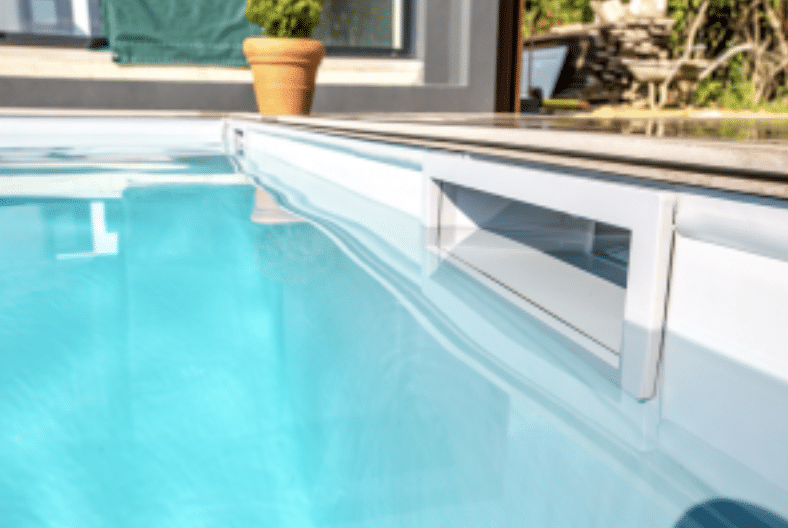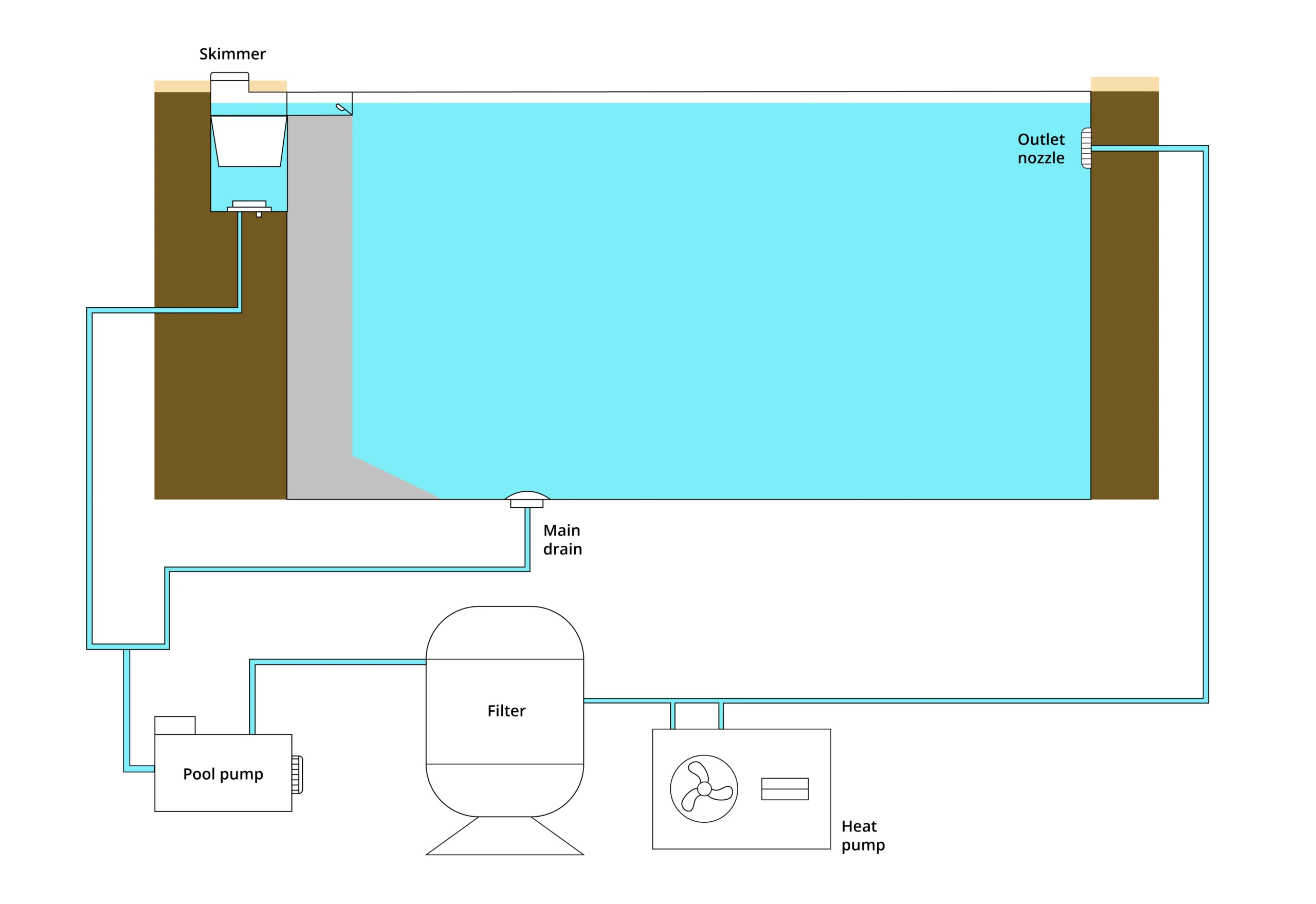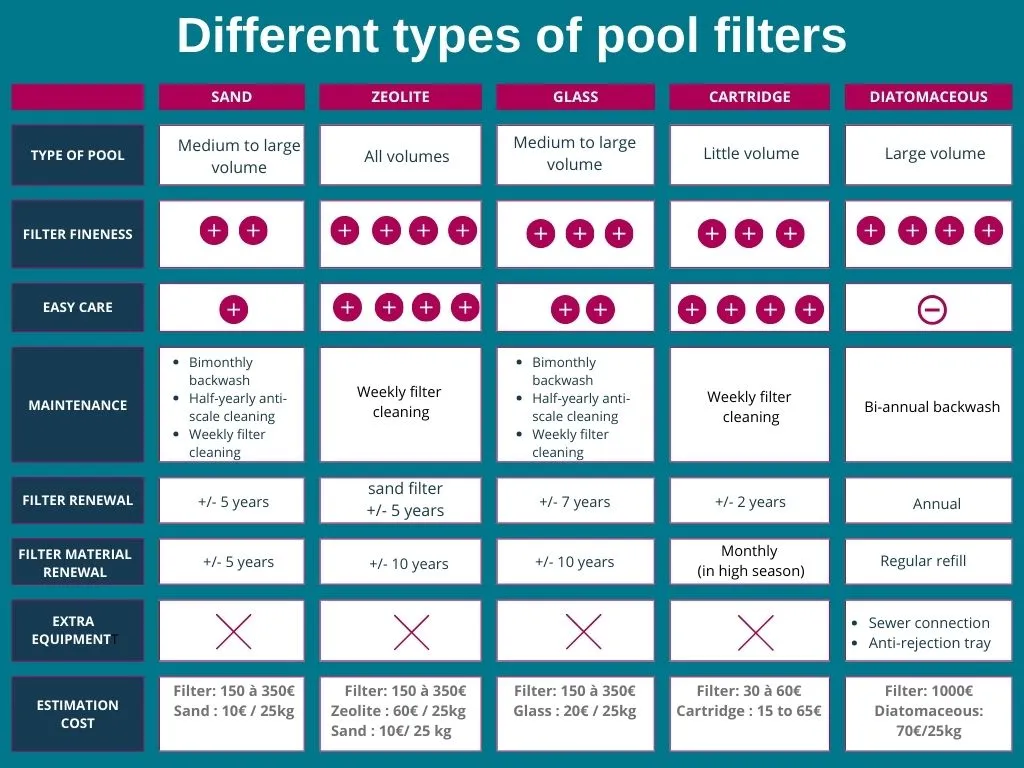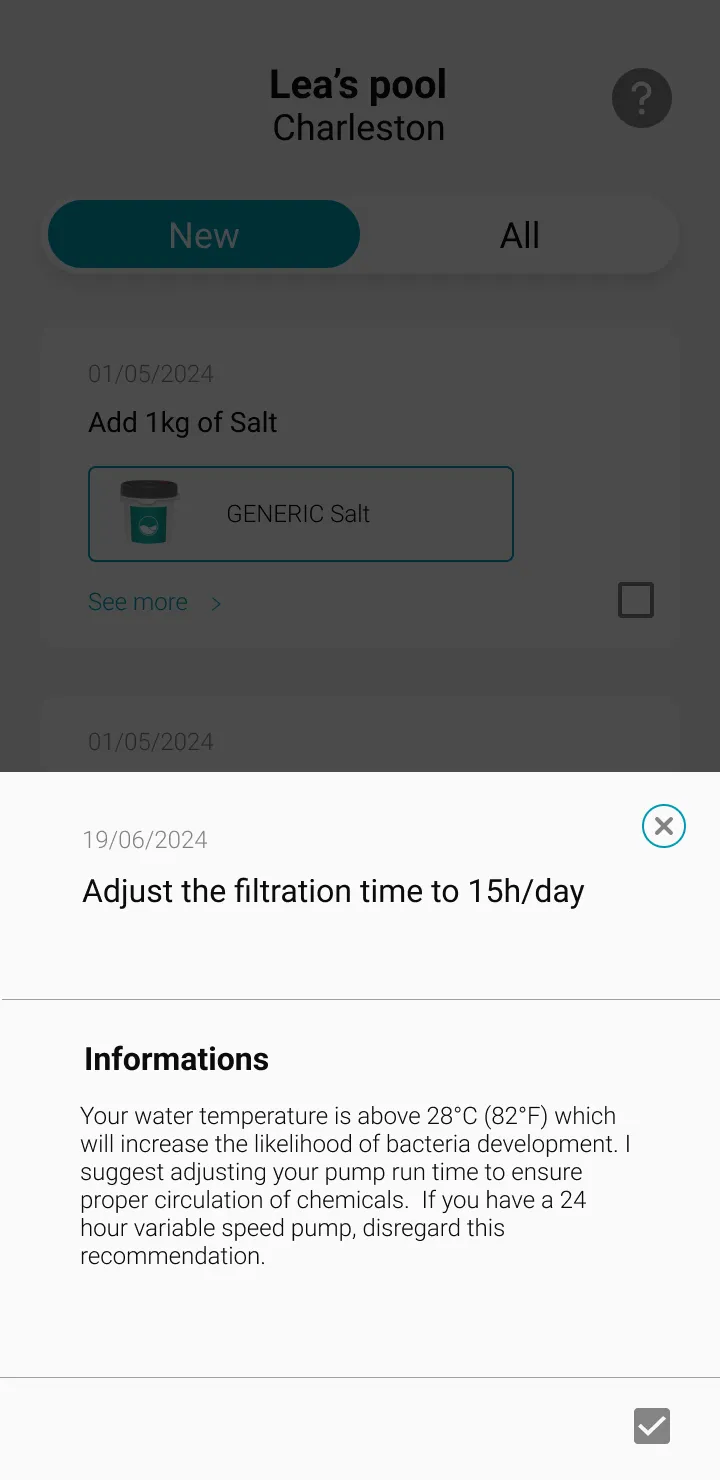Free delivery, French manufacturing, Satisfied customers
Free delivery, French manufacturing, Satisfied customers
Did you know that filtering your pool water alone has a major impact on its quality? Indeed, while filtration retains pollutants and insoluble particles, it also facilitates disinfection, enabling products to act more quickly and effectively. As a result, chemical treatments are only 20% responsible for maintaining balanced water! This is good news for the planet and for your budget, but be sure to choose the right filtration system, and know how to use and maintain it.

The quality of your pond water is directly linked to the quality of filtration, far more than to chemical treatments! The filter, whose role is to retain pollutants, makes it easier to keep the water healthy and clear. There are different types of filter. Most commonly sand, cartridge or diatomaceous earth filters.
The efficiency of a filter is measured in microns, or filtration fineness. The lower the microns, the more the filter retains the smallest impurities. If there's one piece of advice to remember if you're investing in or renovating your pool, it's: don't look for savings at any price when it comes to your pool's filtration system !
To keep your pool water clean, here's how the filtration system works :

If you have a small above-ground pool, opt for a pool purifier, which is a specially designed all-in-one system. It includes a pump, a cartridge filter (see paragraph below) and an integrated closed circuit for the inlet and return of filtered water to the pool. The purifier is installed at the foot of the pond. So you don't need to build a technical room to filter your pool water. It's also a very economical system, available on the market for less than 100 euros (depending on the brand).
There are several different types of filter. Filter size should be proportional to pool volume and adapted to your needs (use, environment, etc.). If you wish to install or change your filtration system, your choice should be based on two criteria: the desired filtration finesse and ease of maintenance.

The sand filter is recommended for large pools that can be filtered quickly. The filtration fineness (30 to 50 microns) is a little less fine than other systems. However, the addition of flocculant improves performance. In terms of maintenance, a sand or glass filter needs to be cleaned every two months during the high season (known as a back-wash) to remove stuck sand residues. Special chemical filter cleaning twice a year (at the time of wintering and restarting) will remove limescale deposits. Finally, you'll need to replace the filter sand every 5 years (between 150 and 350 euros depending on the model).
Zeolite is a micro-porous rock added to the sand filter (the mixture is around 60% zeolite for 100% sand). In particular, it reduces the consumption of chemical products (disinfectant, anti-algae). It's a more ecological solution, with a very high filtration fineness (5 microns). This filter is suitable for all pool volumes. In terms of maintenance, it's also a very simple system, requiring no action whatsoever during weekly servicing (apart from cleaning the filter and pre-filter with water). All you need to do is rinse the rock with clear water before adding it to the sand to avoid dust particles. Zeolite can be changed every 7 to 10 years and costs around 60€/ 25kg.
While the cartridge filter provides fairly precise water filtration (around 15 microns), the volume of water treated is slower than with a sand system. This equipment should be chosen for small to medium-sized pools (9m2) or above-ground pools with low-limestone water. Manual maintenance of the filter should be carried out during weekly maintenance using a jet of water and a soft brush. You can also leave it to soak in a mixture of water and a special filter cartridge cleaner during the high season. In conclusion, the cartridge filter remains one of the most affordable solutions (a cartridge costs between 15 and 65 euros, depending on the model), because the cartridge needs to be replaced regularly: once a month in high season (depending on how often your pool is used).
This is a tank filled with a powder called diatomaceous earth. This is the most precise model in terms of filtration finesse, but if your water is hard or if your pool is very exposed to plant debris, this filter is not for your pool. The diatomaceous earth filter represents a higher initial investment than other systems, because the powder needs to be replaced regularly and a sewer connection installed for the waste water. Maintaining this type of filter requires a bit of know-how, as you need to add powder regularly, check the pressure (bars) in the tank and change the filter membrane. Once or twice a year, a back-wash is required to remove sand residues. Finally, the flow rate of the filter pump and the activation time play a role in the reliability of the filter: a slow flow rate is preferable for the filter to be fully effective. The cost of this type of filter is around €1,000 (to be changed once a year). However, it also requires the installation of an anti-rejection tank.
A pool's filtration time is largely determined by the water temperature. This determines both filtration time and filtration cycles.
The warmer the water, the more microorganisms (algae or bacteria) thrive. It therefore makes sense to filter longer when the water is warmer. The rule of thumb for calculating daily filtration time is to divide the water temperature by 2. For example, if your pool is at 28°C, the optimum filtration time will be 14 hours per day..
In water below 10°C (active wintering), the growth of microorganisms is greatly slowed. So you can just filter for two to three hours a day.
If you have a liner or membrane and are using chlorine pebbles in the skimmer, you will need to turn on the filtration until the pebble dissolves to avoid discoloring your liner.
As explained above, filtration time depends on water temperature. The latter also determines the filtration cycles, i.e. the total filtration of your pool water. The calculation for a total filtration cycle is as follows: pool water volume (in m3) divided by filtration flow rate (in m3) per hour.
What you need to know:
Beyond preserving water quality in high season a full filtration cycle is strongly recommended in cases of algae outbreaks or after heavy use of your pool.
Swimmers bring a lot of pollution into the water, especially if they haven't showered before their swim! You should increase the daily filtration time if you know that the number of bathers will be important. And lower it the next day.
If your pool is surrounded by trees and vegetation, it's easy to understand that, for the same pool size and frequency of use, it will require more daily filtration time.
The hydraulicity of a pool is the way in which the water circulates naturally or mechanically, thanks to circulation nozzles for example. When the hydraulicity is not good, the water is not stirred properly in certain areas of the pool. This creates zones where algae growth is more prevalent. A pool with good hydraulics will need a shorter filtration time.
To activate filtration effectively, here are a few principles you need to remember:

We can never repeat it enough, a good filtration is essential to maintain a healthy and clear water. It is necessary to choose the system the most adapted to your pool and to the frequentation of your pool. To save energy, remember the basic rule of filtration time: water temperature / 2.
Ce site Web utilise des cookies pour améliorer votre expérience lorsque vous naviguez sur le site Web. Parmi ceux-ci, les cookies classés comme nécessaires sont stockés sur votre navigateur car ils sont essentiels au fonctionnement des fonctionnalités de base du site Web. Nous utilisons également des cookies tiers qui nous aident à analyser et à comprendre comment vous utilisez ce site Web. Ces cookies ne seront stockés dans votre navigateur qu'avec votre consentement. Vous avez également la possibilité de refuser ces cookies. Mais la désactivation de certains de ces cookies peut affecter votre expérience de navigation.
| Cookie | Duration | Description |
|---|---|---|
| cookielawinfo-checkbox-analytics | 11 months | This cookie is set by GDPR Cookie Consent plugin. The cookie is used to store the user consent for the cookies in the category "Analytics". |
| cookielawinfo-checkbox-functional | 11 months | The cookie is set by GDPR cookie consent to record the user consent for the cookies in the category "Functional". |
| cookielawinfo-checkbox-necessary | 11 months | This cookie is set by GDPR Cookie Consent plugin. The cookies is used to store the user consent for the cookies in the category "Necessary". |
| cookielawinfo-checkbox-others | 11 months | This cookie is set by GDPR Cookie Consent plugin. The cookie is used to store the user consent for the cookies in the category "Other. |
| cookielawinfo-checkbox-performance | 11 months | This cookie is set by GDPR Cookie Consent plugin. The cookie is used to store the user consent for the cookies in the category "Performance". |
| viewed_cookie_policy | 11 months | The cookie is set by the GDPR Cookie Consent plugin and is used to store whether or not user has consented to the use of cookies. It does not store any personal data. |